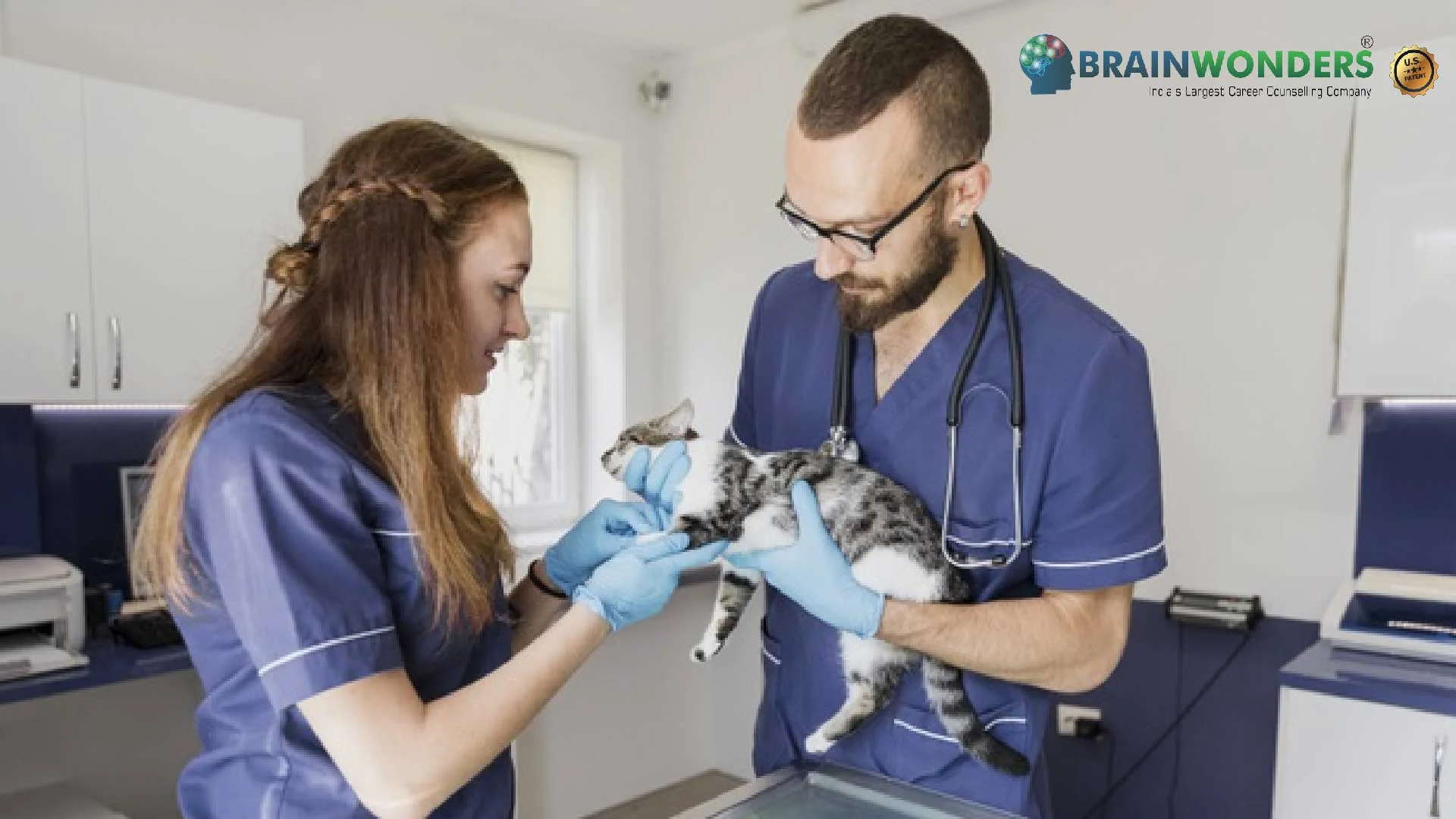How to become a Veterinary Assistant and Laboratory Animal Caretaker
Overview, Courses, Exam, Colleges, Pathways, Salary

Overview
Who is Veterinary Assistant and Laboratory Animal Caretaker ?
Veterinary assistants provide medical care and medical aid to animals. They are responsible for exercising animals, feeding them, bathing them, and restraining them during treatment and examinations. They may also perform laboratory work such as collecting urine samples, drawing blood for testing and so on. Aspirants are generally also trained on the job to assist veterinarians and veterinary technicians which is why they require relatively minor educational qualifications to assume the role of a veterinary assistant as compared to a veterinarian and a veterinary technician. Veterinary assistant jobs can be found at hospitals, private clinics, colleges, universities, and even research facilities. The work may often get physically and mentally taxing as being a veterinary assistant, one may encounter aggressive, frightened or abused patients, potentially being at the risk of getting bitten, or scratched. Veterinary assistant jobs may also require working night shifts, weekends and even holidays.
Typical day at work
What does Veterinary Assistant and Laboratory Animal Caretaker do?
Veterinary assistant job description comprises of the following tasks:
- Assist veterinarians and veterinary technicians with laboratory work
- Perform clerical duties
- Exercise, bathe, feed the animals
- Comfort and restrain pets during examinations and care.
- Clean, sterilize, and maintain kennels, operating rooms, examining rooms, cages, and surgical equipment.
- Administer medications or vaccines to pets
- Provide first aid to pets in an emergency
Abilities and Aptitude needed
What are the skills, abilities & aptitude needed to become Veterinary Assistant and Laboratory Animal Caretaker?
In order to excel in any field, aspirants must possess certain attributes that complement the job role. In a similar fashion, veterinary assistants must possess a strong need to help others, manual dexterity and physical fitness to cater to the animal’s needs with care and a steady hand and lift heavy objects and animals. Besides, veterinary assistants must possess strong listening skills, problem-solving skills and observational skills. Most importantly, veterinary assistants must be patient, empathetic individuals who are passionate about animals and their welfare and treat them with kindness and sensitivity.
Pathways
How to become an Veterinary Assistant and Laboratory Animal Caretaker?
Entrance Exam
Entrance Exam for Veterinary Assistant and Laboratory Animal Caretaker ?
Courses
Which course I can pursue?
Best Colleges
Which are the best colleges to attend to become an Veterinary Assistant and Laboratory Animal Caretaker?
Industries
Which Industries are open for Veterinary Assistant and Laboratory Animal Caretaker?
Veterinary assistants and laboratory animal caretakers can find opportunities in various industries that involve animal care, research, and healthcare. Here are some industries that are open for veterinary assistants and laboratory animal caretakers:
- Veterinary Clinics and Hospitals: Veterinary assistants and laboratory animal caretakers can work in veterinary clinics and hospitals that provide medical care to companion animals, livestock, and sometimes exotic species. They assist veterinarians in providing primary animal care, handling animals during examinations, administering medications, and performing routine laboratory tests.
- Animal Research and Testing Facilities: Research institutions, pharmaceutical companies, and biotechnology firms employ laboratory animal caretakers to care for animals used in research and testing. They provide daily husbandry, monitor animal health, assist with sample collection, and maintain cleanliness and sanitation in animal facilities.
- Zoos and Wildlife Parks: Zoos, wildlife parks, and conservation organizations employ veterinary assistants and animal caretakers to assist with the care and maintenance of captive animals. They assist with feeding, cleaning enclosures, monitoring animal behavior, and providing support during medical procedures.
- Agricultural and Livestock Industry: Veterinary assistants and animal caretakers can work on farms, ranches, or agricultural facilities focusing on livestock production. They assist with animal husbandry, administer vaccines, perform basic medical procedures, and monitor the health and well-being of livestock animals.
- Animal Shelters and Rescue Organizations: Animal shelters and rescue organizations often employ veterinary assistants and caretakers to provide primary medical care and support for needy animals. They assist with examinations, vaccinations, spaying/neutering procedures, and the general well-being of animals awaiting adoption.
- Educational Institutions: Colleges, universities, and educational institutions with veterinary science programs may offer veterinary assistants and laboratory animal caretakers opportunities. They can assist in laboratory sessions, provide support during animal-related research projects, and assist with animal care in educational settings.
- Government Agencies: Government agencies, such as agriculture or environmental departments, may employ veterinary assistants and animal caretakers to assist with animal health and welfare programs, disease control initiatives, and regulatory compliance.
- Wildlife Rehabilitation Centers: Wildlife rehabilitation centers care for injured or orphaned wildlife. Veterinary assistants and animal caretakers can work in these centers, assisting with the feeding, cleaning, and medical care of wildlife species to release them back into their natural habitats.
internship
Are there internships available for Veterinary Assistant and Laboratory Animal Caretaker?
Internship opportunities for veterinary assistants and laboratory animal caretakers may be available in specific settings, providing valuable hands-on experience and professional development. While internships tailored explicitly for these roles may vary in availability, here are a few avenues to explore:
- Veterinary Clinics and Animal Hospitals: Some veterinary clinics and animal hospitals offer internships or assistant positions for veterinary assistants. Interns can gain practical experience assisting with animal care, observing medical procedures, and learning about clinic operations.
- Animal Research Institutions: Research institutions, pharmaceutical companies, and biotechnology firms involved in animal research may offer internships or assistant roles for laboratory animal caretakers. Interns can gain exposure to animal research practices, learn about laboratory techniques, and assist with animal care and husbandry.
- Zoos, Wildlife Parks, and Conservation Organizations: Zoos, wildlife parks, and conservation organizations occasionally offer internships or volunteer opportunities in animal care roles. Interns can gain experience working with various species, assisting with animal husbandry tasks, and learning about wildlife conservation initiatives.
- Animal Shelters and Rescue Organizations: Animal shelters and rescue organizations may provide internships or volunteer positions for veterinary assistants and animal caretakers. Interns can learn about animal welfare, participate in basic medical procedures, assist with animal adoptions, and contribute to the well-being of shelter animals.
- Educational Institutions: Some colleges or universities with veterinary science programs may have internship opportunities in animal care facilities or teaching hospitals. Interns can gain experience supporting animal care, assisting with laboratory sessions, and observing veterinary procedures.
- Government Agencies: Government agencies related to agriculture, environment, or animal welfare may occasionally offer internships or assistant positions in veterinary or animal care roles. Interns can learn about government initiatives, assist with animal health programs, and contribute to regulatory compliance.
Career outlook
What does the future look like for Veterinary Assistant and Laboratory Animal Caretaker?
The demand for veterinary assistant jobs are expected to witness a surge as veterinarians perform more specialised tasks and clinics and hospitals require highly trained professionals to provide general care and perform laboratory work. The job can get unpleasant and sad as veterinary assistants are required to help euthanize ill animals, dispose of remains and comfort grief-stricken owners. However, veterinary assistants get the satisfaction of contributing to the welfare of animals. It is a rewarding and challenging career for individuals who are passionate about working with animals.



.webp)


